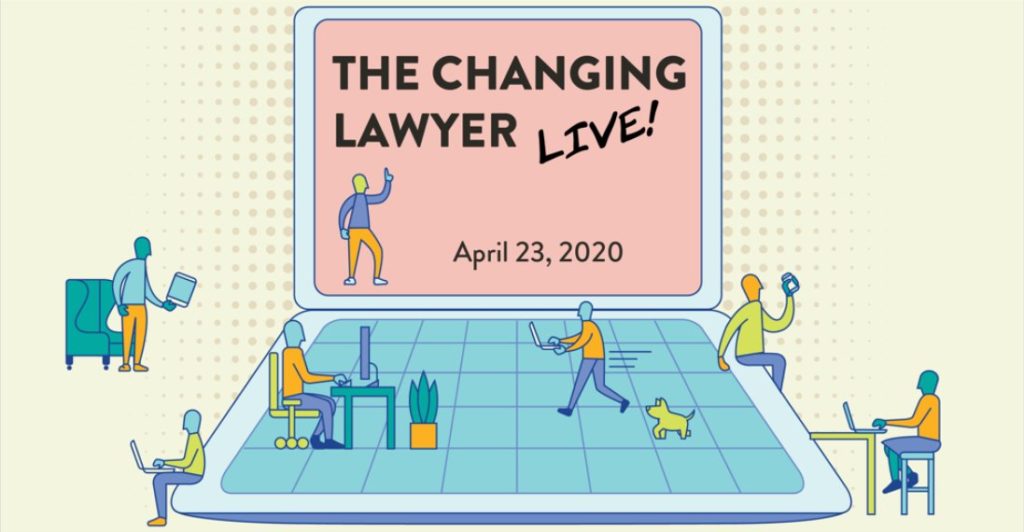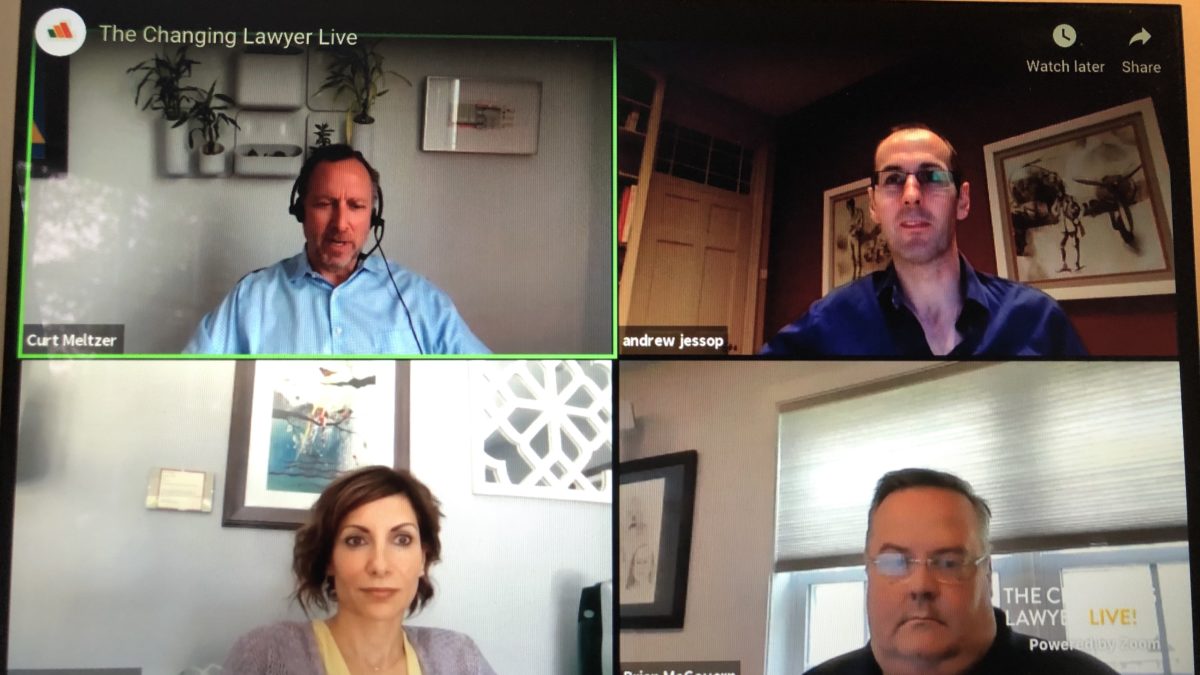This is a live blog post from The Changing Lawyer LIVE! virtual conference, hosted by Litera. This panel is Pandemic Priorities in Corporate Legal Departments with Andrew Jessop, General Counsel, HG Capital; Brian McGovern, General Manager of Workflow Solutions, Mitratech; Stephanie Corey, Co-Founder & General Partner, UpLevel Ops.
Moderated by Litera’s Curt Meltzer.
Though virtual, I am treating this session as I do one at an in-person conference. I write it in real time and post as the session ends. Please forgive any typos and misunderstanding in meaning
[Introductions not captured]
What’s Changed
Andrew: Everyone is working from home. That has driven adoption of tech and new uses of it, including Zoom or MS Teams. On M&A, we manage to finish some transactions, but post the crisis, deal flow will be down.
Stephanie: Legal operations has been driving to cloud and will continue on that path. Moving forward, the sense that all must be in the same place likely will change. We can work effectively on a remote basis. After the initial shock of WFH, most everyone has adapted. GCs, especially of smaller companies, will be more open minded about getting the best talent, irrespective of location. That will be a benefit to Silicon Valley companies given the high cost of housing and awful commutes.
Brian: Mitratech works with over 400 law departments. The big corporates have recovered well; their people are working. Now, there are two groups: the highly impacted ones and less impacted ones. The latter are now rethinking how they work, eg, meetings. In these industries, management is more open to new ideas now.
Relationship Between Corporate Counsel and Law Firms
Stephanie: There’s been an immediate reaction, even without a CFO directive, for law departments to look for cost reductions. This will be no different than 2008 crisis. Many will demand immediate discounts and, over time, more fixed fees. This will accelerate the trend to demand more value – what else can law firms bring to the table? “Just doing good legal work and a discount is no longer enough.” That’s the bad news. The good news is that GCs do look at firms as strategic partners. Firms should come to the table with ideas. So few do this, the bar is low with clients. Even simple ideas will make law firms look good and drive the partnership.
Andrew: In the immediate pandemic response, our advisors have worked hard to produce content and guidance. “The law firms have been fantastic resources for clients on this.” Mid- and longer-term, law firms have to be more thoughtful about what content that put out. GCs won’t read 40 email per day; the content must be targeted, eg, focus just on the jurisdictions in which my company does business. And law firms will have a challenge because other than large insolvencies, they will not the armies of lawyers. They need to keep lawyers busy for up to 18 months – then they will need the armies again. We learned in 2008, don’t lay off all the talent.
Brian: We have to remember the world has changed. One of our clients received paper from one of its law firms. Client was very upset. Keep in mind those changes. Law firms need to ask how clients want to interact, what they need. Because we process millions of invoice, I can say we have not yet seen an impact on billing. But we know it’s a lagging indicator.
How Will Corporate Business Change Long Term
Stephanie: So much has yet to be determined. But we should expect to see downsizing, as we did after the 2008 economic crisis. But there will be opportunities – and a sense of urgency about initiatives such as using tech and being more efficient. Legal departments likely will not hire as many lawyers as in the past; rather, GCs will use ALSP / LPO for scalable work. Future growth will come via this route. The GC should focus on a smaller number of really good people in-house and outsource more -that will provide much more flexibility. We will see a rise in other flexible work arrangements. GCs should focus on core competencies in-house.
Andrew: We will see more WFH and more use of tech. At law firms, with exit of older partners, we will see more investment in tech – and more delegation to tech. That will improve law firm profitability. The economy will take a long time to come back given the massive uncertainty.
Curt, Steph, and Andrew discuss the future of work space and hotels. Given how smoothly video works, travel likely will go down, time in the office likely will go down. Some corporate managers will see the productivity of WFH and will think, why pay for their fancy offices?
Brian: Everyone struggles with, when do we return to normal? It’s so uncertain, it’s hard to process. We cannot control that but we can control what we do now. So we need to deal with now as the new normal and have a good positive impact now. Tech in the last 5 or 10 years has enabled us to operate from home. Focus on the now, not when this will end.
Curt observes that even when we are back in the office, clients likely will want to have video chats. Lawyers will have to stop multitasking!
The New Opportunities
Andrew: We have been humanized with a look into colleagues’ home. That has created more empathy. Lawyers will be more thoughtful about what their clients want. [Curt notes that in law firms, lawyers have new appreciation of staff, especially IT.]
Brian: There are some organizatons that were not invested in being ready for something like this. They relied on walking around. They will have to experience a mindshift, including deploying the right tech. More advanced organizations will look to automate work, especially in highly impacted industries. They will look at their biz model. The most advanced ones will drive their digitization initiatives, coming out with greater insight and ideas to drive their businesses forward.
Stephanie: Law firms are in a great position to help their clients. They need to go to their clients with good information, COVID or otherwise. Talk to clients to understand their pain points.

Archives
Blog Categories
- Alternative Legal Provider (44)
- Artificial Intelligence (AI) (57)
- Bar Regulation (13)
- Best Practices (39)
- Big Data and Data Science (14)
- Blockchain (10)
- Bloomberg Biz of Law Summit – Live (6)
- Business Intelligence (21)
- Contract Management (21)
- Cool Legal Conferences (13)
- COVID-19 (11)
- Design (5)
- Do Less Law (40)
- eDiscovery and Litigation Support (165)
- Experience Management (12)
- Extranets (11)
- General (194)
- Innovation and Change Management (188)
- Interesting Technology (105)
- Knowledge Management (229)
- Law Department Management (20)
- Law Departments / Client Service (120)
- Law Factory v. Bet the Farm (30)
- Law Firm Service Delivery (128)
- Law Firm Staffing (27)
- Law Libraries (6)
- Legal market survey featured (6)
- Legal Process Improvement (27)
- Legal Project Management (26)
- Legal Secretaries – Their Future (17)
- Legal Tech Start-Ups (18)
- Litigation Finance (5)
- Low Cost Law Firm Centers (22)
- Management and Technology (179)
- Notices re this Blog (10)
- Online Legal Services (64)
- Outsourcing (141)
- Personal Productivity (40)
- Roundup (58)
- Structure of Legal Business (2)
- Supplier News (13)
- Visual Intelligence (14)

